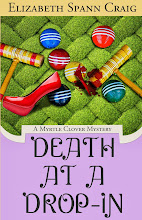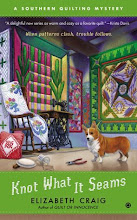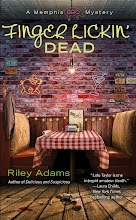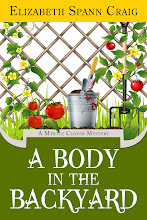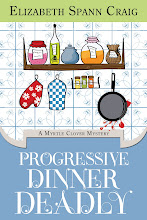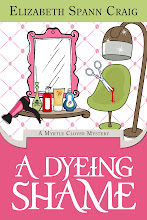Sunday, December 28, 2008
A Research Note
Tuesday, December 23, 2008
Interesting Article
I enjoy my subscription to Poets and Writers. Online, their website has a really interesting interview with four, young literary agents. They discuss the types of material they're looking for, problems facing beginning writers, why it's difficult to secure an agent, and the publishing industry today.
Looking for a Last-Minute Book Gift for a Mystery Reader?
Here's November's list of best-selling mysteries from the Independent Mystery Booksellers Association:
Hardcovers
1 - P.D. James, The Private Patient, Knopf
2 - Michael Connelly, The Brass Verdict, Little Brown
3 - Donna Andrews, Six Geese A-Slaying, St. Martin's
4 - Dennis Lehane, The Given Day, Morrow
5 - Jeffery Deaver, The Bodies Left Behind, Simon & Schuster
5 - Vince Flynn, Extreme Measures, Atria
7 - Katherine Neville, The Fire, Ballantine
7 - Clive Cussler, Arctic Drift, Putnam
9 - Reginald Hill, The Price of Butcher's Meat, Harper
10 - Rita Mae Brown, Santa Clawed, Bantam
Softcover 1 - Elaine Viets, Murder with All the Trimmings, Obsidian
2 - Barbara Cleverly, Bright Hair About the Bone, Delta
3 - M.C. Beaton, Kissing Christmas Goodbye, St. Martin's
4 - C.S. Challinor, Christmas is Murder, Midnight Ink
5 - Jennie Bentley, Fatal Fixer-Upper, Berkley
5 - Clare Langley-Hawthorne, The Serpent and the Scorpion, Penguin
5 - Jeanne Dams, Indigo Christmas, Perseverance Press
8 - John Hart, Down River, St. Martin's
8 - Earl Derr Biggers, The House Without a Key, Academy Chicago Press
10 - Kate Kingsbury, Ringing In Murder, Berkley
10 - Archer Mayor, Chat, Grand Central
10 - Cynthia Baxter, Murder Packs a Suitcase, Bantam
10 - Kate Kingsbury, Shrouds of Holy, Berkley
Sunday, December 21, 2008
Thoughts on the Setting for Your Mystery
Don't underestimate setting as a valuable part of your mystery and serve to set the tone for the book. Some of my favorite reads have placed murderers on virtually-inaccessible islands, in lighthouses, in manor houses during snowstorms, and gritty metropolises.
Cozy mysteries usually will pick a tranquil setting for the murder, and have the murder make a major impact on the community. Whether the setting is a village in England or a small town in the American South, the reader feels the urge to solve the mystery and return the community to its former idyll status.
An isolated setting can create suspense for your readers. If there's a killer knocking out characters one by one, it can really heighten the urgency of solving the case. Agatha Christie demonstrated this beautifully in And Then There Were None.
Thrillers work well in many settings, but my favorites are set in cities like New York, London, or Las Vegas. The glitter of the big cities as backdrops can lend an up-all-night grittiness to the storyline.
Foreign Settings: You can make your reader an armchair traveler by placing your mystery in an exotic or foreign setting. What is exotic depends on the reader: I recently read a series of books set in Quebec, Canada and it provided a true escape through its pages. I've also read books set in Egypt, Greece, and various European countries. As long as the setting doesn't distract from the plot, it can really help to set the tone of the novel. Maybe your protagonist is in a country where they don't speak the language (or very well.) That can also serve to add more tension to the mystery.
Saturday, December 20, 2008
Make Your Mystery Believable
Sometimes when I'm reading mysteries, I have to suspend my disbelief. That's okay, as long as it isn't too long. I want to enjoy each book I read, but sometimes that's hard to do when I'm distracted by unbelievable plot devices.
Amateur Sleuths' Involvement: Why is your sleuth involved in the case? Were they accused of perpetrating the crime themselves? Was someone close to them accused? Were they intimately involved with the victim and feel they need to track down the killer on the victim's behalf? Searching for a murderer is a dangerous activity--and the reader needs a viable reason why it's necessary for the sleuth to get involved.
Suspects' Motives: If there's only one suspect with a good motive, we'd have to assume that person is the killer. The strongest motives for killing someone are for gain (money, power), revenge, hate, love, fear (having something uncovered, losing something precious.) Usually people don't kill others for minor slights or jealousies.
Killer's Motive: I've occasionally read mysteries where I just wasn't convinced the murderer had a good reason for what they did---the story had a trumped-up feel about it. When I read those, I think, "Well, no wonder I didn't peg him as the killer. It doesn't make any sense that he'd have done it." Unless it's clear that the killer is a raging psychopath, there should be a clear reason (and a good one) that he would have risked everything to murder the victim. After all, we're talking about possibly facing a death sentence or life in prison for the crime.
Confrontation With the Killer: I covered this in a recent post (which referenced a blog post on adding suspense to your book.) Most books include a scene at the end of the book where the detective (amateur or professional) reveals and confronts the murderer. Be sure to make this scene believable. Would your sleuth really knowingly confront the killer in a deserted location with no backup?
By thinking ahead, you can make your manuscript stronger and more believable. That will keep your reader hooked until the last page.
Sunday, December 7, 2008
Christmas Mysteries
Now, a holiday treat for anyone who's interested in Christmas mystery reading: a list of Christmas-related mysteries, courtesy of Grave Matters.
Enjoy!
Friday, December 5, 2008
Adding Suspense
I came across a very insightful blog post today, that I thought I'd share. On the Make Mine Mystery blog, there was a post by Mark Troy that included excellent suggestions on adding an element of suspense to your murder mystery.
Suspense is important even in cozy mysteries; it provides momentum for the story and comes in especially handy at the climax of your novel. Would your book be as interesting if, after your sleuth names the killer, he's quickly and easily arrested by the police? Yes, there's satisfaction that the detective--amateur or professional--solved the crime and that the murderer has been detained, but it's not exactly riveting reading.
Troy suggests isolating your protagonist (in most cases your detective) to create suspense. He points out the problem facing all writers--how to put the protagonist in a dangerous situation without making him or her look foolish for being in it.
The entire article is interesting, and I really recommend it for anyone looking for ways to make their novel more exciting. Here are some of Mark Troy's ideas for isolating your detective (believably) with the murderer:
Have your detective confronted while he's out gathering evidence.
Have your detective isolated with the killer while he's in a remote setting.
Have the killer turn out to be a mentor or friend of your detective.
Have your detective eagerly run ahead of his backup and end up in the killer's clutches.
Troy offers many other ideas for adding suspense, too--some of them involving internal isolation techniques--so be sure to check it out. I thought it was a fresh perspective on an old plotting problem.
Tuesday, December 2, 2008
Creating Suspects for your Mystery Novel
So you're busily cooking up your mystery recipe, fully realizing some innocent victim or two will die as a result of tasting it. One of the most important ingredients in your fatal stew is the suspect.
Choosing suspects: Who murdered your victim? Suspects aren't usually eager to be classified as such. It's up to your police detective or sleuth to connect the dots. Was there a public argument between your victim and suspect? Did your victim confide in their friend about a suspect (if so, is the friend in danger, too?) Would the suspect gain monetarily from the victim's death? Was there another obvious reason besides money (revenge, love, hate) that could have motivated a suspect? Who was close to your victim? Who loved or hated him?
Number of suspects: Try not to bog your reader down with too many suspects. If you're writing a 65,000-- 85,000 word book, cramming in ten suspects with varying motives, means, and opportunity can make the plot pretty confusing. Usually, the smaller the number of suspects, the better. Cozies frequently confine the number of suspects to five or six and let the reader get well-acquainted with them.
Suspect names: Try not to name your suspects with similar-sounding names or with names that start with the same letter (if you have a Kate, don't have a Karen.) You don't want your reader to find out the name of the killer and then have to flip through your book to find out who they were.
Suspects who move along the plot: Your suspects are going to want to stay out of jail. To do this, they might lie about their motive or opportunity or implicate other suspects. If their implications are false (or don't lead to the actual killer), they're red herrings. The suspects can also provide genuine clues to the murderer (perhaps a clue that the suspect doesn't even realize is key to the case) or can clumsily reveal their own guilt (accidentally breaking their alibi, revealing knowledge that only the killer could know, displaying guilt, nervousness, or other out-of-character traits.)
Suspect deaths: Sometimes mystery writers will kill one of the book's prime suspects. Not only can this add more urgency to the plot (this murderer must be caught before he/she can kill again), but it can add another layer of depth to the mystery--why was this particular suspect killed? What did they know?





